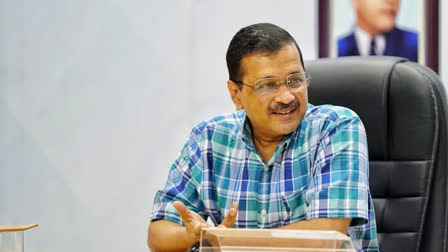New Delhi: The Supreme Court on Thursday reserved its verdict on Delhi Chief Minister Arvind Kejriwal’s pleas seeking bail and challenging his arrest by CBI in the excise policy case.
After hearing day-long arguments in the matter, a bench comprising Justices Surya Kant and Ujjal Bhuyan reserved its order on petitions by Delhi CM Arvind Kejriwal seeking release from the CBI’s custody in connection with the Delhi excise policy case.
During the hearing, senior advocate A M Singhvi, representing Kejriwal, submitted that the CBI arrested his client nearly two years after filing the FIR in the case and he was not even named in it. "Three court orders are in my favour. This is an insurance arrest, so that he can be kept in jail," argued Singhvi.
Singhvi said the apex court needs to address three questions: is there a flight risk? Will he tamper with evidence? Will he influence witnesses? He answered these questions by saying that the Delhi Chief Minister is not a flight right as he is a constitutional authority, and there is no question of tampering with the evidence, as there are lakhs of documents many of which are digitized, how could his client have influenced witnesses while being in judicial custody, and also five charge sheets have been filed in the matter.
Singhvi stressed that his client poses no threat to society and his arrest by CBI is just for insurance, and no substantial material was demonstrated before the trial court judge to justify Kejriwal’s arrest, and the central agency’s grounds justifying his arrest were vague.
Singhvi argued that the CBI says Kejriwal is not cooperating with the investigation and concealing the true facts even after being confronted with evidence, and added, “What will I say, yes I am guilty”. He pointed out that all the co-accused in the case, including Manish Sisodia and K Kavitha, were granted bail in the bail.
It was argued before the bench that the CBI’s own statement indicates that their last witness was in January 2024 and Kejriwal was arrested by the Enforcement Directorate in March, and both the Supreme Court and the trial court have ordered his release. Singhvi questioned, why is there a need for further arrest? Has anything changed in the past three months?
Singhvi further argued that Section 41A of the CrPC was introduced in 2010 to regulate arrests and it was intended to prevent arbitrary arrests and to ensure that law enforcement cannot simply barge in and arrest someone without a valid basis.
Additional solicitor general S V Raju, representing the CBI, vehemently opposed any relief for Kejriwal and stressed that there cannot be special treatment regarding bail for a special person, and added that there is no special person in law at all and “all other aam aadmis (common man) have to go to sessions court”. Reading out witness statements, Raju emphasized that it indicated that Arvind Kejriwal was the "key conspirator" in the Delhi excise policy case.
Raju made it clear that in the case no fundamental right was violated and it was not a fit case for intervention by the apex court. Justice Bhuyan said snakes and ladders observation in the judgment granting bail to another co-accused Manish Sisodia not a charitable observation for the prosecution.
Raju stressed that if everyone were permitted to go directly to the high court for bail, the sessions court would become redundant, and people would bypass it, which would burden the high court. Raju insisted that this would undermine the purpose of Section 439 of the CrPC, which is to provide a structured process for bail applications.
Raju contended that there is a Punjab connection to the Delhi excise policy, and a distillery owner Mahadev was arm-twisted to pay bribes and he was pressured that his distilleries would face action and they would be blocked from restocking unless bribes were paid. Raju said Mahadev was told that the solution to his problem lies in Delhi and not in Punjab.
Regarding the utilization of bribe money in Goa election, Raju said that several individuals in Goa are also implicated in this matter and if Kejriwal were to come out on bail then those witnesses may become hostile, and insisted that no leniency should be shown to the Delhi CM.
The central agency informed the apex court that when it issues a Section 41A notice for questioning, then there may not be an intention to arrest and the person who receives the notice is not completely protected from arrest. Raju said the person can be taken into custody, if there are justifiable reasons.
The top court had on August 23 allowed the CBI to file its counter affidavit in the matter and gave two days to Kejriwal to file a rejoinder. The apex court said that a bail matter has consumed the entire day. Raju said if the apex court were to grant bail to Kejriwal then it will demoralize the high court.
Kejriwal has filed two separate petitions challenging the denial of bail and against his arrest by the CBI in the case. He has challenged the August 5 order of the Delhi High Court upholding his arrest.
The AAP chief was arrested by the CBI on June 26. On August 14, the top court refused to grant interim bail to Kejriwal in the case and sought a response from the probe agency on his plea challenging his arrest.
